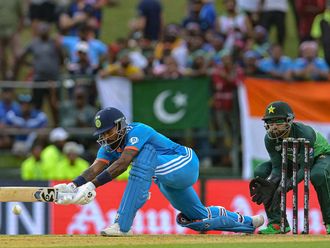
Catches win matches is an age-old saying in cricket. It’s so true since spilled catches can change the fortunes of teams, and that was evident in the Women’s T20 World Cup.
In most matches, at least a couple catches went down. It happens. There can never be a 100 per cent record in any game. However, when several catches go down, the result is impacted.
At least three crucial fixtures were lost due to poor catching. India paid dearly for dropping three catches against Australia in a must-win match and crashed out of the tournament. Pakistan dropped eight in the New Zealand match, which could have been their passport to the semifinals. An unbeaten England, a favourite to win the tournament, dropped four catches against the West Indies and are packing their bags for the flight home.
How fielding made a difference
India, Pakistan and England could have fared better if the catches were held. Australia would have ended up with fewer runs, and India’s chase would have been easier. Pakistan’s batting has been their Achilles heel, but their task against New Zealand would have been less demanding. England could have stifled the West Indian pursuit by removing Qiana Joseph, whose stroke-filled half-century sealed a semifinal spot for the Caribbeans.
The results could have been different, and the semifinal lineup would have worn a new look. But there’s no place for ‘ifs’ and ‘buts’ in cricket. -win match.
What was clear is that fielding impacted these games. Not only did the Australians remain calm under pressure against India, they also raised the level of catching and ground fielding at a critical juncture. Phoebe Litchfield ran out a batter, while wicketkeeper Beth Mooney accounted for another in the final over against India. Four dismissals in the over altered the result of a match that went to the wire.
The mark of champions
That’s what champion teams do. It explains why Australia won six of the eight T20 World Cups. They are in pole position to win the seventh in the UAE, despite losing captain Alyssa Healy and fast bowler Tayla Vlaeminck to injuries.
New Zealand’s impressive fielding was a critical factor in their revival after a string of 10 losses in the runup to the World Cup. They held all the catches in Monday’s win over Pakistan and were generally good throughout the tournament. Captain Sophie Devine’s catch taken over her left shoulder while running backwards to dismiss Sri Lanka’s Anushka Sanjeevani was one of the best.
Maddy Green dropped a sitter in one of New Zealand’s early matches, and Australia’s Ellyse Perry and Darcie Brown too had grassed one each. It just goes on to show that even the best fielding teams are not immune from dropped catches. The difference is such errors are few and far between for them.
Plenty of catches went down in the league phase. Catches at cover point and short midwicket are tricky: the fielders hardly get time to react. So a team’s best fielders cover these positions. So not many catches have gone in these areas; in fact, there has been several sharp takes.
What’s perplexing is the sheer number of sitters dropped in the deep, especially at long-on. Fielders get ample time to get under the ball, yet a worrying number of catches went down.
Why are so many catches going down? Some say it’s the “Ring of Fire” lighting at the Dubai International Cricket Stadium. That can’t be true. Because it should affect all teams, not just a few. And the lights don’t come on during the day games.
Is poor technique the culprit?
How do you explain the missed sitters at the Sharjah Cricket Stadium? That too in broad daylight. It reflects poor catching technique and nerves. Catching can be improved with adequate practice. Even tardy fielders can become safe catchers with training.
Why do a well-drilled side like England, former champions, field poorly. Pressure in high-voltage encounters can get to the best fielders. That’s perhaps the only way to explain three drops by Maia Bouchier against the West Indies.
Imagine dropping a catch of a batter, who goes on to play a result-altering innings in the final. That’s akin to dropping the World Cup. It’s a captain’s nightmare.




![Copy of SPO AFP FILE- INDIA PAK [1]-1734891164918](https://imagevars.gulfnews.com/2024/12/22/Copy-of-SPO-AFP-FILE--INDIA-PAK--1--1734891164918_193ef925509_small.jpg)





